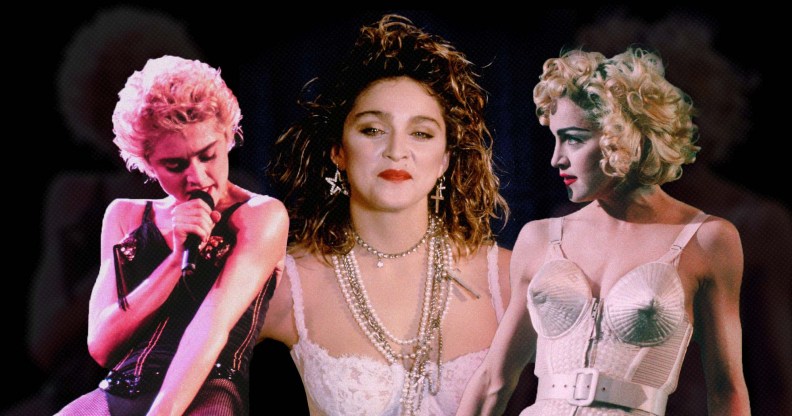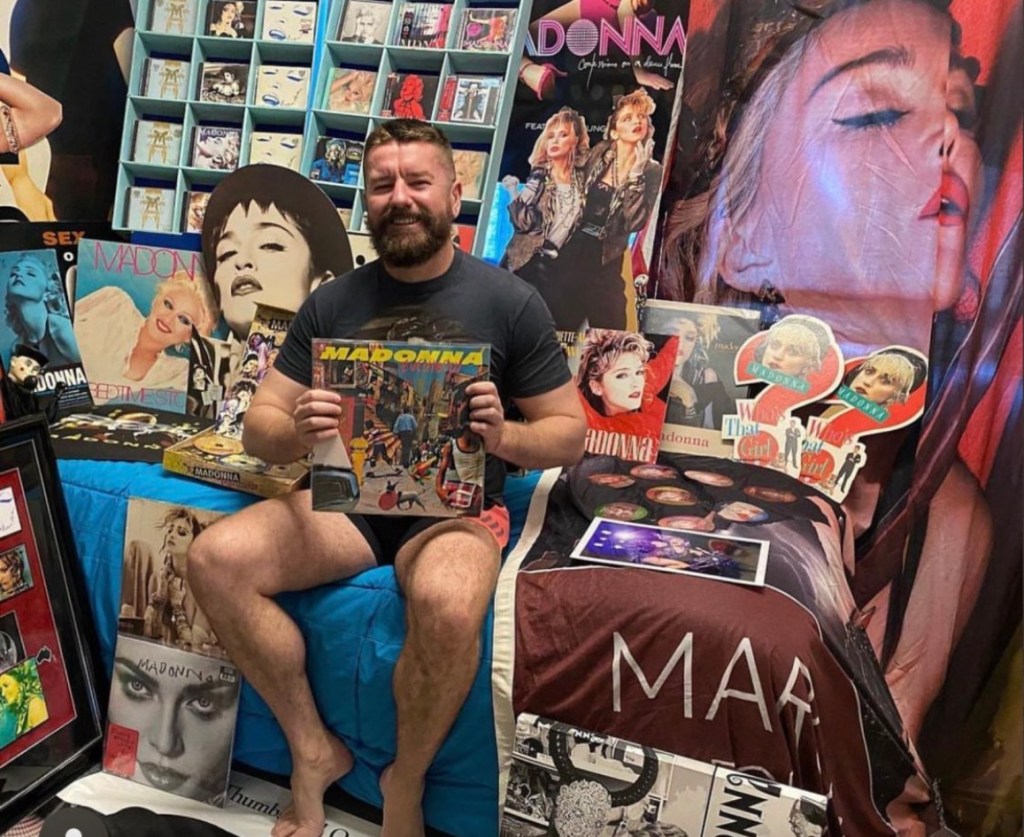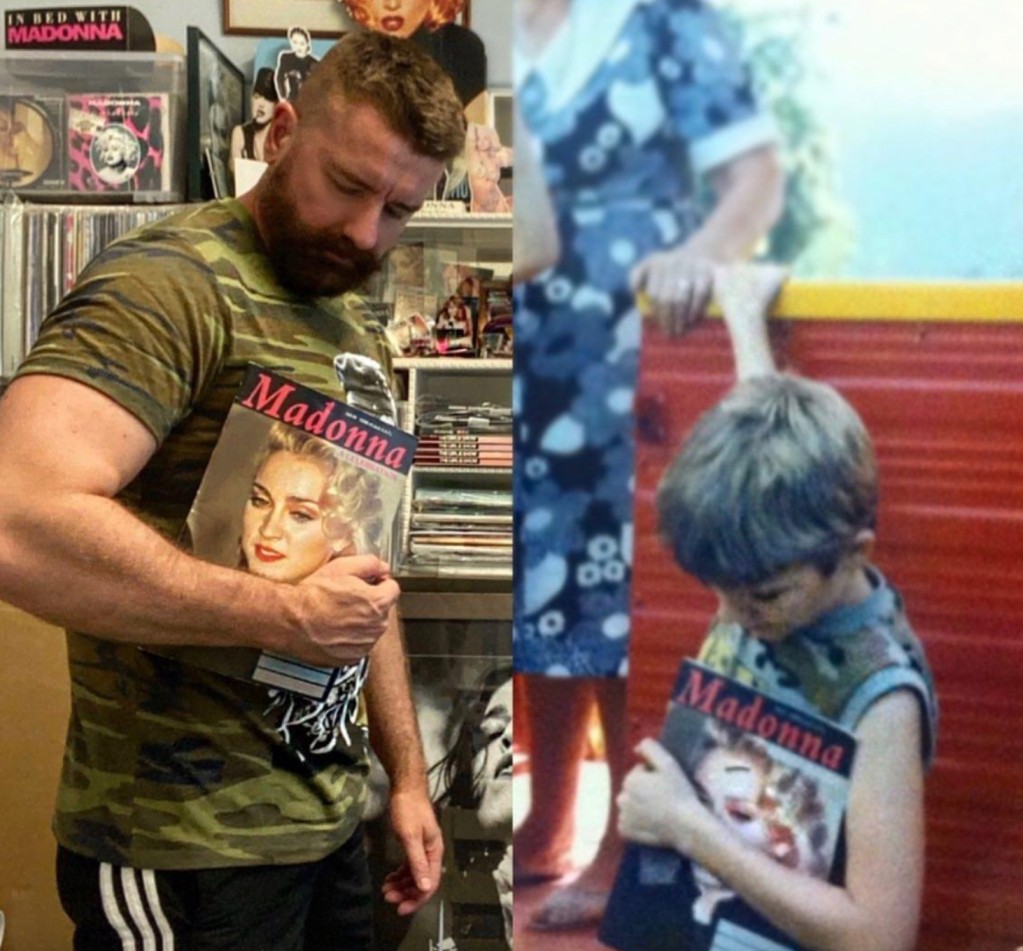Madonna superfans reflect on her life, legacy and how she taught LGBTQ+ people they matter

Madonna’s biopic is a go-er, but it might be a TV series. (Getty)
As Madonna announces more Celebration Tour dates, her fans reflect on why she will always be an icon.
Forty years into her career, Madonna’s fans are no stranger to defending their icon – and right now is no different.
It happened like clockwork: last week, hours after Madonna announced the Celebration Tour to mark four metamorphic decades in the game, the trolls came out of the woodwork to proclaim their disgust.
“Madonna has now become the most grotesque, train-wreck embarrassment in the history of world entertainment,” cried chief outrage commodifier Piers Morgan, awash with fury at her decision to tour. “She’s too old,” he said. “It’s all over.”

The Daily Mail chimed in too, concerned that her “aggressive sexuality” is now “threatening to compromise” her uncompromisable legacy. They lambasted her for being “desperate”, and urged her to “give it up”.
As a 64-years-old pop star, this isn’t the first time that Madonna has been told that her expiration date has arrived. She was just 35 and ten years into her career when, in 1993, the now-defunct Smash Hits magazine told her to “calm down, grandma”.
She’s been called an “ageing pop tart” a has-been, a disgrace who has lost all our interest.
Yet Madonna has never cared about retaining our interest. Anyone who thinks Madonna’s key aim is pushing her own desirability has spent 40 years missing the point.
Her legacy is built on doing exactly what her detractors told her not to do. She isn’t ahead of the curve; she bent the curve into shape, and that is exactly why her fans adore her.
How the Queen of Pop changed pop culture
“Pop music can be viewed in two parts,” says Matt, a 47-year-old from Brisbane, owner of one of Australia’s largest Madonna merch collections. “Pre Madonna, and post Madonna. In the post Madonna world, female recording artists have more freedom of expression, more authority in the industry,” he says.

It’s a point that bears repeating – no woman in pop culture today travels a path that is without Madonna’s influence.
Before meat dresses, there were cone bras. Before “Dirrty”, there was “Justify My Love”. Before break-the-internet photoshoots, there was a book called Sex.
Madge knows it, too. In an Instagram post last October, she reflected on the response to her 1992 photography book and its longstanding influence.
“I spent the next few years being interviewed by narrow minded people who tried to shame me for empowering myself as a woman,” she remembered. “Now, Cardi B can sing about her WAP. Kim Kardashian can grace the cover of any magazine with her naked a**, and Miley Cyrus can come in like a wrecking ball. You’re welcome b***hes.”
“Pop music will always be changed as a result of Madonna’s extensive legacy,” says Matt. “In 20 years, artists like Beyonce, Rihanna and Taylor Swift will be able to tour and not face misogynistic, ageist criticism and commentary as a result of Madonna once again carving a path for them to follow.”
Pavel, from California, agrees. The 54-year-old runs a Madonna fan account on Twitter, and believes the queen of pop’s legacy is her ability to shape-shift with every album and tour.
“The biggest mark [Madonna] made is giving pop singers the courage to take risks and reinvent their sound, image, message, identity, and point of view with every album,” Pavel says. “Madonna created the ‘era’ concept.”
Madonna pushed boundaries and changed lives
There’s pushing boundaries, and then there’s shattering social norms and saving lives in the process. Madonna’s unapologetic support for the LGBTQ+ community sits in the latter camp.
At the height of the AIDS epidemic, when silence from outside the LGBTQ+ community was still deafening, Madonna took action. When her fourth album Like A Prayer was released into the world in March 1989, Madonna insisted that every copy have a safe sex pamphlet slipped inside, entitled ‘The Facts About AIDS’.
Alongside the facts, Madonna wrote: “People with AIDS – regardless of their sexual orientation – deserve compassion and support, not violence and bigotry.”
“It was great to see her embrace LGBT people when absolutely no one else with that level of fame would,” says Edward, a 52-year-old from Cardiff, and the co-creator of the world’s most listened to Madonna podcast, Inside The Groove. “I myself probably wouldn’t be alive today if the 19-year-old twink I was in the late 80s hadn’t read and followed the safe sex advice that was included in her Like A Prayer album.”
Matt, the collector in Brisbane, also believes that Madonna has “taught generations of LGBTQI+ people that they matter”, starting with the decision to “risk her career” by tackling AIDS prejudice.
“Decades later, LGBTQI+ people have significant support from popular entertainers and this is a direct result of Madonna leading the fight,” he says. “We all need to thank her for that.”

Madonna’s commitment to the LGBTQ+ community extends far beyond her AIDS activism, though — from supporting Ellen DeGeneres and Rosie O’Donnell when they came out, to denouncing Russia’s intolerance of queer people while in the country (and refusing to pay the fine for doing so).
Even today, the mere fact of inviting RuPaul’s Drag Race winner Bob the Drag Queen to open her Celebration Tour is a nod to her affinity with the queer community.
For Matt, though, it was the arrival of her 1991 film In Bed With Madonna that changed his life. For many young queer people growing up in the 90s, the documentary was the first time they saw gay men existing, unapologetically camp and simultaneously sexy, on screen.
“I became a fan and collector all the way back in early 1987 when I was 11, so it feels like she has always been with me,” he says. “And at the right time, when I was a kid trying to understand my sexuality, she released In Bed With Madonna and showed me in that film that it was going to be ok.”
“At so many key moments in my life, through love and loss, good times and bad she has always been there and always will be.”

There is no end to Madonna. She transcends time
Madonna is an entity, a concept. It’s her legacy that matters – her age and how she lives it is irrelevant.
“She can’t win because if she had aged in a traditional way, that would be wrong too,” says Edward, the podcast host. “You remember the little boy from the ‘Open Your Heart’ video, Felix Howard? He is old, grey and bald now. No shame in that, but it’s a reminder that we all age and yet Madonna is told how she should do it.”
This is true, but no one has said it better than Madonna herself.
On stage at the Billboard Women in Music ceremony in 2016, accepting her award for Woman of the Year, she said: “I think the most controversial thing I have ever done is to stick around.”
As she prepares for her sell-out Celebration Tour, she has proven that she’s not only sticking around: she’s on top of her game. Thirty-five tour dates have now rolled into 60 plus, thanks to excessive demand. She is as booked, busy, and as legendary as ever.
So no, Piers Morgan. It’s not all over.
How did this story make you feel?

